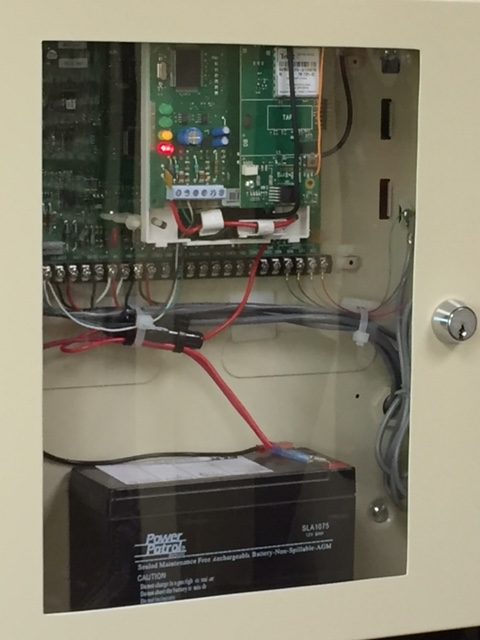While many of our alarm customers hate to think about the prospect, homes with security systems still get broken into. Ideally, the presence of a home security system encourages potential thieves to look elsewhere for a victim. If not, you would hope the blaring siren and potential police response lessens the damage done during a robbery. However, occasionally burglars defeat alarm systems and carry on their crime just as if no security system were present.
In this post, we wish to share some common ways that burglars defeat alarm systems. Of course, as part of this discussion we also want to share tips on how to overcome these measures. We’ll start with a couple actions burglars take that disable alarms entirely. From there, we’ll look at how thieves try to escape your alarm’s detection. Finally, we’ll give some insight into making sure your alarm’s communication and police response work as quickly as possible. Let’s begin with a look at one of the most basic ways that burglars get into homes with security systems: breaking in during a blackout.

Stocking up on backup batteries, such as the Interstate Battery model shown here inside of an Interlogix Concord 4 panel, can keep your alarm running even through extended power outages.
Taking Advantage of Power Outages
Power outages can easily help burglars defeat alarm systems. While most alarms come with a backup battery, these have a couple limitations. For starters, even a fresh battery generally only lasts 24-48 hours. Therefore, burglars feel comfortable breaking into an alarmed home during an extended power outage. Additionally, many customers fail to test or exchange their backup batteries as needed. An old battery could leave your alarm without power within a few short hours during an outage. Even impatient crooks breaking into a home the same day as a power outage may not activate the alarm.
In our Emergency Preparation Tips for Alarm Customers, we touched upon this topic. In that post, we recommenof an emergency. Doing so can allow you to change batteries as needed during a power outage. Purchasing and learning to use a battery voltage meter will also allow you to maintain batteries at all times. Testing your batteries regularly and having ded stocking up on backup batteries in case extras on hand for needed exchanges can help ensure that your alarm continues to work throughout any power outage.
Disarming Your Alarm with a Code
Many alarm customers give out the same code to anybody who may need to disarm their security system. After all, why attempt to track who uses which code when the same four digits can work for everyone? As it turns out, we have very good reasons to avoid the “one code fits all” approach. In our Five Security System Use Tips, we outlined why homeowners should pass out — and track — different alarm codes. The longer you use the same code, and the more people you give it out to, the greater the chance that it lands in the wrong hands. Acquaintances or “friends of friends” often turn into criminals after obtaining your alarm code.
Perhaps a close friend wrote your alarm code on a piece of paper that others have seen. Or maybe a contractor disarmed your system in front of a “curious” employee. Handing out different alarm codes can create additional security in a couple different ways. For one, doing so allows you to delete codes once you no longer need them. This will deny access to any additional individuals who stumbled upon the codes. Furthermore, using different codes allows you to track who uses your alarm, in case someone with a code does enter your home uninvited. Our “open-close” reporting service described in our Unique Security Monitoring Options post allows you to track exactly who arms and disarms your security system — and when. Let’s look at another way burglars attempt to bypass alarm systems.
Searching for Your Alarm’s “Weak Spots”

Burglars place an emphasis on getting into a home’s bedrooms. Leaving a bedroom’s windows unarmed can allow thieves to burglarize bedrooms without ever activating an alarm.
A few months back we posted a collection of Home Security Risks Alarm Customers Often Overlook. In that post, we discussed how many alarm customers fail to address even basic second-story security. Most of our customers advertise their alarm systems with yard signs and stickers. Since this can turn potential thieves away, we recommend taking this step. However, this practice also alerts determined burglars to the presence of an alarm, which in turn encourages them to predict where you have sensors installed if they still choose to attempt a break-in. Basement doors and second-story windows, in particular, are sometimes left unarmed. Furthermore, many homeowners do not arm every window in the house. This often provides access to certain rooms without triggering an alarm.
Burglars defeat alarm systems especially easily when the most important areas of the home are also the most vulnerable. Due to the possibility of finding cash or jewelry, they often seek out bedrooms in particular. If you fail to install a window contact on your bedroom window or a motion detector that covers this room, you can experience a devastating crime that your alarm never picks up. While some alarm customers install a minimal amount of security to keep costs down, we do not recommend it. Burglars are well aware of common loopholes in alarm systems. If you close these loopholes, you’ll be one step closer to thwarting even the most determined burglars.
Cutting off Your Alarm’s Communication
Occasionally, burglars defeat alarm systems even when activating the alarm creates a blaring siren response. If burglars thinks a victim’s home may have an alarm system, they will likely cut the home’s phone lines. In many instances, that homeowner’s alarm will no longer dial for help after the break-in. We discussed in our recent Tips for Your Security System Upgrade how many customers have moved away from landline-based monitoring for just this reason. Installing a cellular dialer removes the risk associated with landline-based monitoring.

If you have your security system monitored through a home phone line, a burglar can easily disable your alarm communication.
A cellular dialer uses a cell network to communicate with the central station. This allows your alarm to communicate with our central station and activate a police response regardless of your home phone line’s status. Additionally, some cellular dialers, such as ours powered by Alarm.com, provide you with the option to add interactive cellular monitoring. On top of providing secure alarm monitoring, this service also allows you to control your alarm with your smart phone. Furthermore, Alarm.com users can receive text alerts about changes to their alarm system’s status, including alarm activations caused by a potential burglary. Let’s look at one more trick burglars use to in houses with alarms, and how you can combat it.
Staying as Long as Possible After Activating Your Alarm
Many, many alarm customers feel a bit hesitant about installing an alarm system. We go over many of the reasons for this in our post Tackling Ten Common Home Security Myths. In that post, we discussed the prevalent belief that alarms do not help catch criminals. Even in the case that an alarm does everything you want it to, burglars may stick around a little while. Unfortunately, police response times vary greatly from one neighborhood to the next. Additionally, response times can also vary based on the locations of police vehicles at any given time. Many burglars have a good idea of which areas take the longest for police to arrive. You can do a few things to help expedite a police response to an alarm at your house.
For one, police departments know which houses cause the most false alarms. If you keep your alarm maintained to avoid false alarms, you may receive a quicker response to a true emergency. Furthermore, interactive cellular monitoring can help you initiate the quickest possible response to a burglary. Central stations do not make any phone calls until an alarm has sounded for 30 seconds. Interactive cellular messages, however, show an alarm almost instantly. This allows you to call the police yourself before hearing from the central station. Since alarm calls happen fairly frequently, this encourages the police station to prioritize your in-person request above a regular security-system generated call.
Creating a Complete Solution for the Ways Burglars Defeat Alarm Systems
We hope that this post has given you some insight into how burglars defeat alarm systems. More importantly, we hope we’ve given you some ideas on how to counteract these tactics. Perhaps you have an alarm and now have some ideas to make it more burglar-proof. Or perhaps you wish to install a new alarm without leaving any gaps in security. Either way, we encourage you to contact us with any questions you may have. We provide free site surveys for homeowners. While on site, we can address any concerns you may have and make suggestions of our own. Together we can create a security plan that addresses the various ways that burglars defeat alarm systems.
